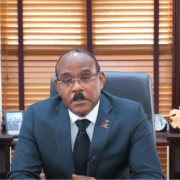Black Immigrant Daily News
Stephen Drummond, the Jamaican-born attorney who represented veteran Dancehall artist Flourgon in his US$300 million copyright infringement case against Miley Cyrus, says Steely & Clevie Productions must put up a “tough fight” in its lawsuit against a slew of Reggaeton artists for infringing on the label’s Fish Market riddim.
The Hanover native, who was speaking on Radio Jamaica’s Beyond The Headlines with Dionne Jackson Miller, said the Jamaican label’s case, while very “challenging,” is “not insurmountable.”
“I took the opportunity to pull the complaints… and I would say these cases are challenging, but it doesn’t mean one should be discouraged by the fact that they are challenging. And my overall opinion of just this area of law – and not just specific to this case – is you have to put up a tough fight. Even though the odds may seem against you from time to time, don’t be discouraged by it. Put up a tough fight and then be prepared to take it all the way,” Drummond advised.
Steely & Clevie. Left: Cleveland Constantine Browne (Clevie), right: Wycliffe Johnson (Steely), who died in 2009 in New York at age 47.
“It is a challenging case; that is my assessment of it. It is challenging but not necessarily insurmountable,” he added.
Steely & Clevie had initially filed three separate lawsuits against Panamanian artist and producer El Chombo, Puerto Rican artists Luis Fonsi and Daddy Yankee, and dozens of other Reggaeton artists, producers, and record companies.
On July 15, 2022, the three lawsuits were consolidated into a single action.
It is alleged that 56 Reggaeton songs — including Despacito, Rompe,Dura, Gasolina, and Shaky Shaky — ripped off elements from the Fish Market Riddim.
In pointing out some of the possible defenses to the lawsuit, Drummond said that the statute of limitations could be the Achilles heel of the case, which the label would have to overcome.
“Fish Market is said to have been created in 1989. That’s quite a long time ago. It is alleged that someone took it. The first question you have to ask, is ‘when did the person take it and when did you come to find out that someone took it? And why didn’t you act before? So you have a statute of limitations, in just about any area of law. Copyright law is no different in that regard,” he argued.
“But that’s a long time ago for someone not to have taken action and that part of it presents some challenges. There could be a myriad of reasons as to why you didn’t, but I am fairly certain that that argument will be advanced. That even if it’s alleged that someone took it, why did you sleep on your rights so long? And that question is always asked in law. That why you have to act and act early and the first thing I would recommend is get your work copyrighted. Because once you do it, chances are someone won’t just go out and just take it like that,” he emphasized.
Added Drummond: “The other point I want to make is when was it copyrighted? When did they first get their work copyrighted. Because even if they were to prevail, that component of it can affect the damages, the value of how much money you are entitled to.”
Steely & Clevie first registered its US copyright for the Fish Market riddim in June 2020 as a “sound recording and music,” according to public records obtained by DancehallMag.
Drummond said another issue likely to be raised is whether or not the production duo had permitted anyone else to use the riddim, before the Reggaeton artists’ expropriation.
“So just from reading the article and what’s alleged in the complaint., at some point the Fish Market riddim was given to Dem Bow. And that was given, it said, ‘to Shabba Ranks with permission’. Well, the question becomes ‘did another party that you gave permission to then give it to another party’? And if that party that you gave permission to, gave it to another party, can you allege that it was taken from your original song or your original rhythm? All of those things, they are not unique just to this case but it’s just part of things to be considered,” he said.
Shabba Ranks‘ Dem Bow, produced by the late Bobby ‘Digital’ Dixon, had used the Fish Market beat from Jamaican vocalist Gregory Peck’s Poco Man Jam, one of the 1989 tracks on Steely & Clevie’s original riddim.
In their complaint, Steely & Clevie noted that “in 1990, subsequent to the release and success of Shabba Ranks’ Dem Bow, Denis Halliburton aka “Dennis the Menace” had replayed Dem Bow’s instrumental to record a Spanish language cover version of Dem Bow entitled Ellos Benia.
They claimed that another song titled Pounder by the duo Patrick Bernard aka “Bobo General” and Wayne Archer aka “Sleepy Wonder,” had a “B Side,” which featured an instrumental mix of Halliburton’s sound recording, and that “this instrumental has been sampled widely in Reggaeton and is commonly known and referred to as the Pounder riddim,” which “is substantially similar if not virtually identical to Fish Market.”
Drummond continued: “So when I say challenging, those are the hurdles. One of the good parts of the case is the argument of access… you have to establish that the other party had access to it. The riddim is so worldwide known and it is so well-distributed that they won’t have a challenge demonstrating that people knew of it or that the people who have alleged to have infringed on their work, knew of it.”
Drummond, who is based in New York, was at the helm of the team that dragged pop singer Miley Cyrus to court in 2018 for plagiarizing the line “we run things, things no run we” from the deejay’s 1998 track We Run Things and embedded it in her 2013 single We Can’t Stop’ altering the lyrics to “We run things, things don’t run we.”
That case was settled in January 2020 to the “mutual satisfaction of all parties.”
Follow us for daily Dancehall news on Facebook, Twitter and Google News.
NewsAmericasNow.com










